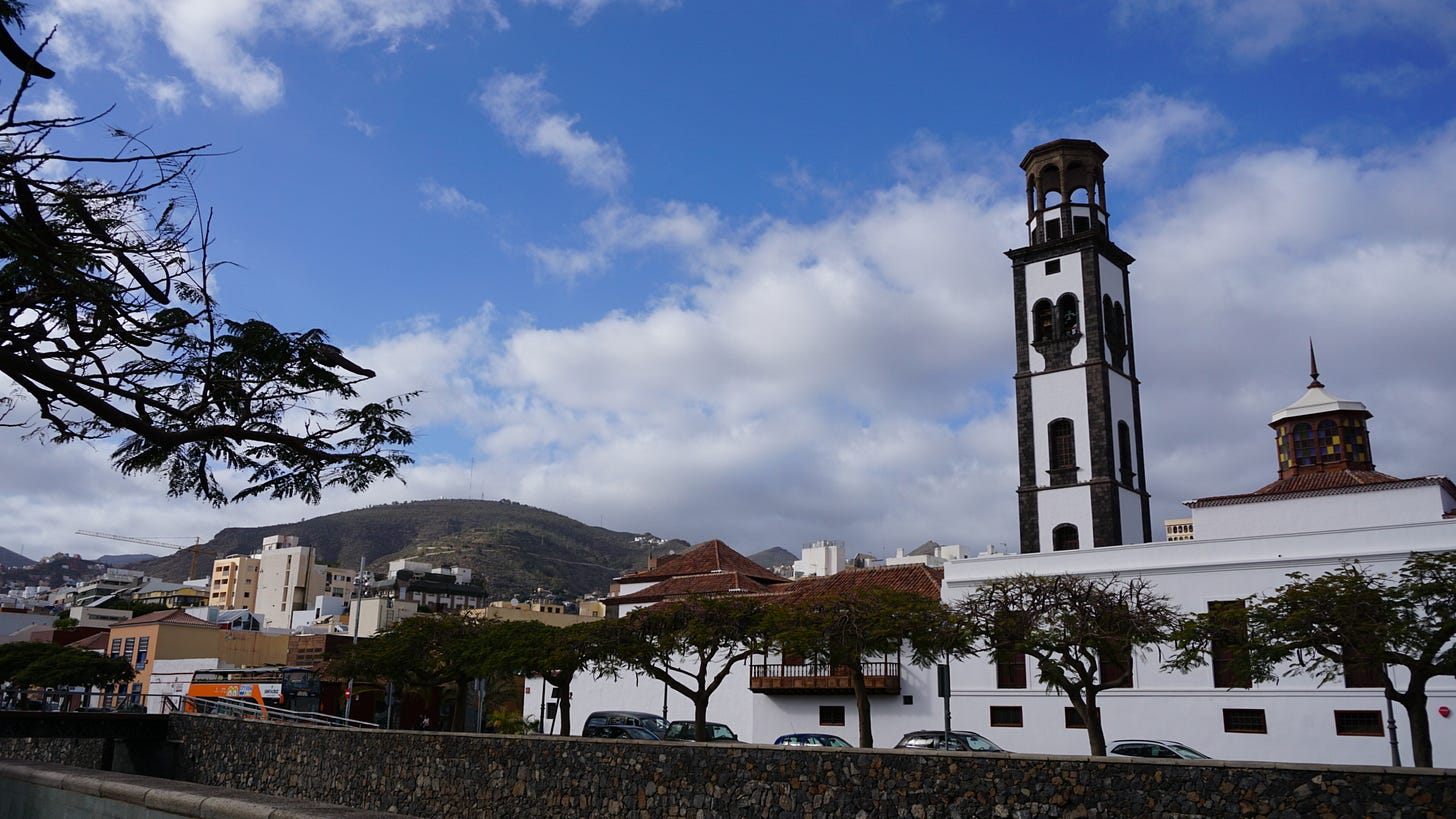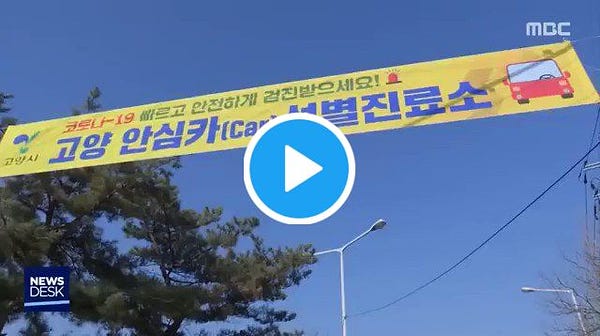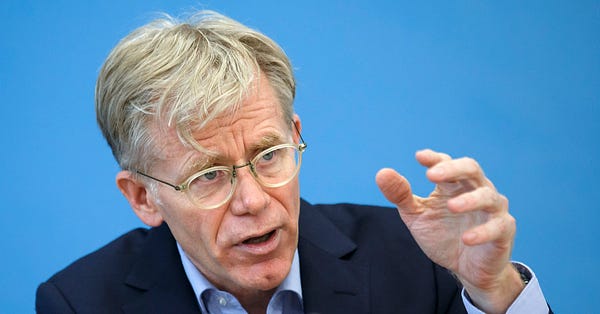March 14th: Greetings from Tenerife

👋 Welcome to Lucien, Karen, Charlotte, Chris, Navras, Reuben, Zena, Brandon, Clayton, Oliver, Lionel, Erwin, Duong
📍 Canary Islands until its safe to travel
✍ Turned my newsletter on the "New Economy" into a longform essay with new material and analysis:
- The Reality of The New Economy: Go Tech, Go Solo Or You’re SOL”#1 The Next Few Months & Perhaps Longer
When I was in Taiwan at the end of January the entire country went into panic mode similar to what’s happening across the world right now. I was impressed with how fast the country went into crisis mode with temperature checks everywhere, events cancelled and nearly 100% of people wearing facemasks as early as January 20th. I didn’t write about it at the time because it seemed most people were not that worried across the world.
Those first few weeks in Taiwan were tense. You could cut the tension in the air with a knife. Part of their response is due to their memory of SARS, the risk of being so closely connected to China and their experience containing a food borne illness over the last year, African Swine Flu. There is also a bit of luck involved that no infected patients became super-spreaders like happened in the Korea church.
In early February I came down with one of the worst throat infections I’ve ever had on February 5th that didn’t let up until several days later when I started taking antibiotics. They never tested me because I had no travel history to China. Before the antibiotics started to work, I was in peak fear mode.
I’m okay now, but now my friends and family in the US seem to be moving towards a similar state. I told a family member last weekend that there will likely be a rapid rise in tests this week and that the US will turn to 100% fear mode. Unfortunately, that looks like it was correct.
I see a lot of people going through different stages of denial but it seems eventually people move from “its just the flu” to “its bad, but I’ll be ok” to “oh shit I’m part of a big system and I need to avoid contributing to a potential systemic collapse of the healthcare system.”
This is likely going to be a tough time for many. I’m having the best couple month stretch of my self-employed life in the last few months, but I don’t expect it to last. My mindset in self-employment has been to build savings to be able to last a long period without work and that will likely be the reality for the second half of 2020. We will see.
Many of us are having to make drastic changes to the way we are living and will likely have to deal with increased uncertainty for the next year or more. This is going to be uncomfortable for a lot of people. Yet if you are in a place with some level of stability in your life, I hope that you can quickly shift to think about what you can offer the world.
Is it giving money to people who don’t have as stable job, is it calling a friend, or is it singing into the streets like this beautiful video from Siena?


I think we all underestimate what we can offer the world. Our brains are wired to think about action in terms of what can be paid for. Let’s dream bigger.
Personally, I’m starting to look for ways I can help and/or donate to people who are struggling. I’ve talked to many people over the last several years about transitioning to new phases and new roles in life. I’ve also grappled with uncertainty the entire time I’ve been self-employed. I’m not the worlds foremost expert in this space, but at minimum I’m happy to listen and be a friend. If you want to chat, I’m here.
🙏 Join a Group Video Hangout Next Wednesday
Next Wednesday, I’m hosting a Curiosity and Connection virtual meetup with Jonny Miller, who has gone on his own life journey after crisis over the past few years.
We have no clear agenda, but just want to give a space to explore with others who are managing uncertainty and want to connect.
You can join us here. #2 Rethinking Meetings In A Remote World
In a short podcast episode, Seth Godin makes the argument against using remote work to copy in-person working habits, especially meetings.
Meetings give us insight as to who’s up and who’s down. Who’s being honored and who’s being disrespected. We live in a meetings culture. It is very hard to change it even if you’re the boss.
He argues against shifting from 8 people in a room to 8 people in a zoom chat. Instead, if the meeting really about making a decision, have everyone spend time before the meeting to write down what they actually believe.
From the co-founder of Basecamp, a successful remote company:

I wrote about how many companies who have shifted to remote work find that writing is one of the most essential skills of building a successful operating model and culture.
Psychologist Daniel Kahneman has done a lot of work helping people make better decisions and has argued that meetings should be used once people have already prepared:
You may want people to write down the decision they are in favor of before the discussion starts. Its going to give you a broader diversity of points of view and it forces people to be better prepared.
Running these kind of meetings takes work and preparation and people often don’t want to do it. Showing When Kahneman was asked about why people don’t implement these ideas?
Too much work
Another idea is Gary Klein’s “pre-mortem” can be a good way to think about meetings for important projects. His idea is to travel to the future in which the project has failed and try to come up with a list of reasons why the failure occurred:
A typical premortem begins after the team has been briefed on the plan. The leader starts the exercise by informing everyone that the project has failed spectacularly. Over the next few minutes those in the room independently write down every reason they can think of for the failure—especially the kinds of things they ordinarily wouldn’t mention as potential problems, for fear of being impolitic.
and then
Next the leader asks each team member, starting with the project manager, to read one reason from his or her list; everyone states a different reason until all have been recorded. After the session is over, the project manager reviews the list, looking for ways to strengthen the plan.
Most meetings I went to in my career were places where people started thinking about the work, shared information in a ritualized weekly performance or showed up to impress very important senior people about the status of a project.
Most meetings were harmless, but some drove me a bit mad
In one job I spent nearly the entire 2+ years at the company doing the work for a “major project” that could have been completed in two months. I spent hours every week preparing updates and coming up with new and better ways to show the same two or three options. I would then attend meetings with very important highly paid people and they would talk through the options. |They would give thoughtful reactions in executive-speak without making any decisions. I would go off to find more information and present the same information the following week.
Eventually I begged to be taken off the project at the expense of my career trajectory but to the benefit of my own sanity. This kind of meeting is happening at most companies across the world right now and I’m begging you to use this shift to remote work to question it!
In Godin’s podcast, he shares the story of his friend Toby who runs a company with 1000+ people:
One weekend he wrote a script for their company wide google calendar and what he did was he cancelled every single regular meeting that was on the calendar. And then he sent an email to everyone in the organization. I just gave you four hours of your life back every week. If that meeting that got cancelled was important, feel free to replace it. If you really need to have the meeting, go back and put it on the calendar.
If you’ve gone remote, use the opportunity to rethink default business behavior. Cancel the meetings. Have people write out what they think instead. Schedule a 15 minute Zoom meeting to make the final decision. See if you can give people back some time.
👉 Want help? If you’re a leader of a team and want help trying to navigate the shift to remote work, you can book a micro-consulting session here.
#3 Fragility & Possibility
The US labor economy is optimized for employer profit and then holes are patched through a series of state laws and other various protections. Many states have taken leadership on this and have passed sick leave, predictable schedule and minimum wage laws to help many hourly and low-wage workers gain some stability and security in this increasingly atomized and precarious labor economy.
Walmart, with more than a million employees, just implemented this policy:
\Walmart said that hourly workers who work in a store, club, office or distribution center will receive up to two weeks pay if they’re required to quarantine by the government or by the retailer.
That’s great, but some estimates have shown that Wal-Mart relies on generous subsidies from the government to make its business model work. Some estimates have shown that Wal-Mart employees get more the $5 billion in government assistance every year.
They do deserve some credit as they seem to be changing things a bit and for the first time gave hourly workers 48 hours of paid sick leave last year - but many other employees just abdicate the responsibility and that means many people when making the choice are likely going to show up sick to work this week or next.
This pandemic will likely force us to rethink our global economy that’s built on just-in-time supply chains, tightly linked financial systems, a patchwork healthcare system and an increasingly atomized labor market.
In the long-term, we may see many changes, but its fascinating to see the creativity of different possibilities emerge across the world:
Italy and the UK suspending mortgage payments (didn’t know that was possible!)


Free 10-Minute Drive Through Testing In Korea


Moving routine healthcare and prescription refill online in China


#4 The Virtuous Cycle For Universities
Purdue has kept tuition flat for several years and increased the student body as well as improving the overall experience. Kudos to them for escaping the insane US News Prestige chase:
“When I got here,” he told me, “there was an effort to become the ‘Stanford of the Midwest,’ an elite institution along those lines,” which would have meant shrinking enrollment, cutting out kids at the low end of the class to skew the average toward the top.
and just focusing on increasing enrollment and improving the education
And so a virtuous circle was established, according to Purdue and its president. The predictably flat tuition attracted more students, creating a larger student body that brought in increased revenue, which allowed for the hiring of more and higher-quality faculty, whose research the university could profitably license to the private sector, where alumni, delighted at the celebrated achievements of their alma mater, helped increase donations by 136 percent over six years, which in turn has helped keep the freeze in place.
It will be interesting to watch what happens with universities as they seem to have sent everyone home for the semester. Will be interesting to see how students react in terms of pursuing their own learning and if any schools are able to innovate.
#5 Free Book On Remote Work
I’ve read it and its pretty good.


Want to Become A Micro-Supporter Of This Newsletter?
👉 If you'd like to become a recurring patron for $1 a month or more, you can join 23+ others Patreon or find other options here.
💡 My self-paced course, Reinvent, is now available.
💬 Comments are enabled for everyone. Leave your thoughts below 👇If you want to learn more about who I am or what I’m working on, find me here, say hi on twitter, or check out some of my longform writing.
If you aren’t subscribed to the e-mail, join us here:




